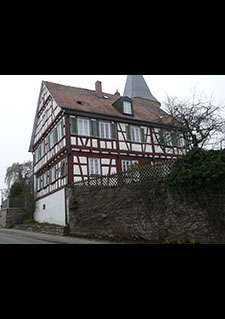An Open House: The Parsonage in Gebersheim
The parsonage located at the outskirts of Gebersheim, a village of five hundred residents, was ideal for providing Jews disguised as “bombed-out refugees from Berlin” a place to stay for a reasonably short time. The parsonage was an open house in which many people came and went and guests were also always visiting. Elisabeth Goes recalled:
I sometimes put the Jewish guests up in the attic room, sometimes in my husband’s empty study. And in the village I said that friends or relatives were visiting me. That often happened anyway during this period. Hence, nobody really took note of my special guests. Otherwise, I was afraid amazingly little in those days. Our parsonage stood at the end of the street. The yard was somewhat elevated and concealed behind a large wall, and the visitors were normally very cautious. I therefore hardly worried at all. (Elisabeth Goes’s handwritten account of Jewish guests in her house. Property of her daughter, Rose Kessler.)
The courage of this pastor’s wife, who was thirty-three at the time, was nevertheless admirable. She had three young children, her husband was at war and she was more or less responsible for representing the parish. A schoolmate of her daughter Brigitte, born in 1936, Elisabeth Faber recalled:
One can no longer imagine today what all Mrs. Goes did. Pastor Goes was at war for five years and thus only the pastor from Höfingen was there on Sundays to preach. However, she had to do everything that had to be attended to in such a village parish. There was the children’s service. Mrs. Goes could tell stories so marvelously that one could really picture the stories from the Bible. Then there was the girls’ circle, which was always held in the pastor’s living room, and she often had prepared something special for us. One has to bear in mind that there was nothing to buy in those days. So, we made something nice out of old fabric or paper. Music was played and there was always much singing. It also happened that she had to ring the bell and also play the organ. The parsonage yard also had to be tended to and the big parsonage had to be kept tidy. Sometimes she even went with the farmers to the field to hoe or to pick potatoes or even to pick hop cones. (From a lecture by Elisabeth Faber, Gebersheim, about Elisabeth Goes at the District Women’s Day on February 18, 1995 at the Haus der Begegnung, Leonberg)
Source / title
- © Photo: Eberhard Röhm, Leonberg

